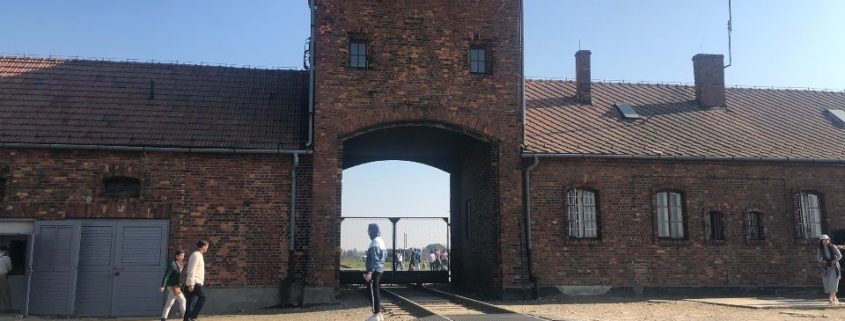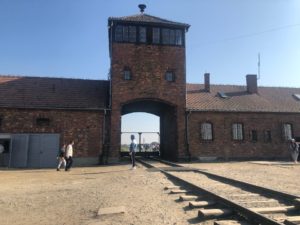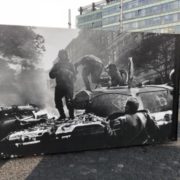Rethinking Remembrance
By Rody Conway
The 20th century was a century of unprecedented growth, prosperity, and freedom. Conversely, the events of the 20th century set the bar for the scope of human cruelty. While genocide has existed for as long as there have been people, the frequency of large-scale attempts at eliminating entire defined groups of people peaked in the last century. The combined death toll has no firm estimate but most likely ranges in the tens of millions. In the West (Europe and the Anglosphere), the Holocaust has occupied a unique place in the public consciousness. When asked to think of a genocide, the extermination of the Jews in Europe will likely be the first (and perhaps only) example that comes to the mind of the average Westerner. The dominance of this event in the collective mind of the West has several explanations. The Holocaust is deeply connected with the European front of WWII, which itself holds a defined place in western consciousness. Additionally, Jews were a much higher percentage of the populations of various European states than today, and thus had a defined historical impact on all of said states. For example, in prewar Poland every tenth citizen was a Jew. Now the Polish-Jewish community numbers fewer than ten thousand people.
While traveling through the capital cities of Central Europe, our program brought us to many noteworthy Holocaust memorials and museums. No two places were the same, and each presented a different set of characteristics that reflected the national contexts and the diverse goals of their designers and architects. However, the memorials and museums in and of themselves were not what I found most striking. Instead, I was consistently intrigued by the way in which our group responded to them. Most memorials and museums were met with attitudes and statements that ranged from skepticism to outright denouncement. If the memorial was secluded and discreet, like the Roma memorial outside of Prague, then our group thought it should be bigger and more accessible. If the memorial was very publicly visible and readily accessible, like the Shoe Memorial in Budapest, then it was guilty of commodification and of not telling the story properly. Most interactive museums were dismissed as oversimplified tourist attractions. When thinking about this collection of statements and reactions, I asked myself a question: What is the ideal memorial on which my colleagues are basing their criticisms? To critique anything is to state that it is not meeting a standard that a given critic has set. I am left without a defined answer as to what constitutes a good memorial. Is it defined by context? Is it defined by its intended audience? Is defined by its ascribed purpose?
Despite the apparent lack of an answer to the question of what defines a good Holocaust memorial or museum, I have noticed one common theme: Remembrance. The primary axiom on which Holocaust education, or memorials, museums seem to be based, is the idea of remembering. This idea, as I understand it, seems to rely on the assumption that remembering the Holocaust will make a comparable event less likely in the future. I recall a time when I found this idea compelling. It seemed obvious. However, as I continue to read relevant literature, whether in my spare time, or for classes, I become more and more cynical of the future. I believe post-war prosperity in the developed world has blinded us to what makes a genocide possible in the first place. I find it very difficult to believe that most Americans or Europeans would concern themselves with caution and compassion in the face of near total economic and social degeneration. Conditions have altered the milieu of relatively peaceful and moral societies before. Human nature has remained in approximately the same place for tens of thousands of years. The same things that appealed to people in what turned out to be genocidal regimes, will always appeal to people if certain conditions are met.
Is remembrance a sufficient preventative measure? I would say no. I don’t think actively trying to domestically combat genocide will be effective in the long run. Even in Germany, which has been hailed by many as the ideal in terms of Holocaust education, is seeing various forms of backlash against it. The reactions range from apathy to direct opposition, neither of which were intended by policy makers. Stability and prosperity within a society make domestic genocide unlikely if the historical record of 20th century genocides is to be believed. In this way, it is best prevented by not allowing society to degenerate into chaos. I would term this passive prevention. However, while it may seem to be the most effective tool for restraining genocidal impulses, it cannot be relied upon. Societal circumstances change. Alternatively, active prevention would historically refer to a genocide being stopped by foreign intervention. Unfortunately, this is how most genocides are ultimately stopped. Whether it be the Holocaust (stopped by Allied invasions), the series of genocides of the Yugoslav wars (stopped by NATO intervention), or the Cambodian Genocide (stopped by Vietnamese intervention), all were stopped by an outside force.
What then, is the problem with remembrance? It is not a problem in and of itself, as it is often helpful to have an accurate picture of the past. As I see it, the problem comes when we focus too much on remembrance as a means of preventing future genocide. There’s a certain amount of moral comfort that comes with critiquing other countries attempts at remembering tragic events of their past. What do these critiques actually accomplish aside from personal moral satisfaction? If the countries of Central Europe were to tackle their past head-on and rebuild all memorials in the image of a righteous bystander’s ideals, would that ultimately have a net positive effect? I would say no. While I will concede that I do not have the answer to the question of the best way to prevent a future European genocide, I will simply advise caution to those who readily assume that their morals and ideals, if put into practice, would do any real good toward that end.














